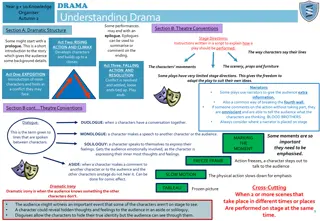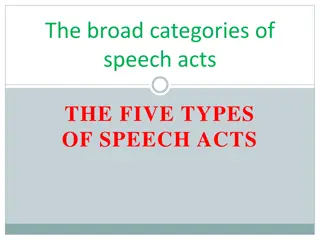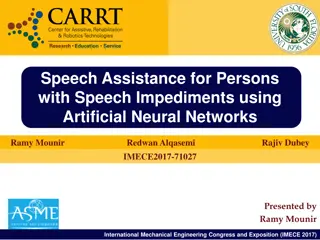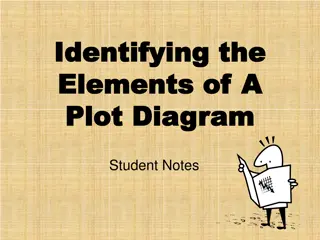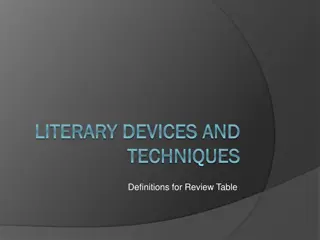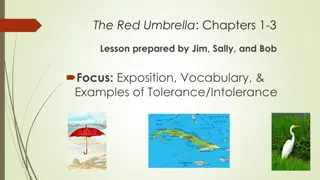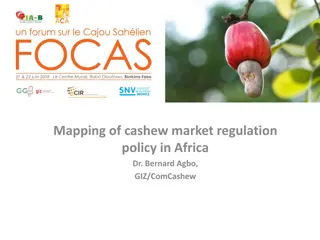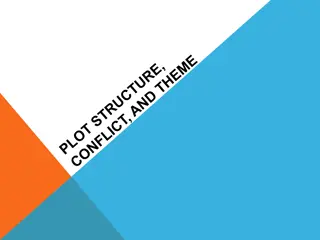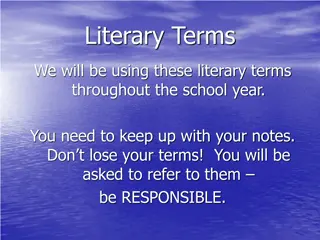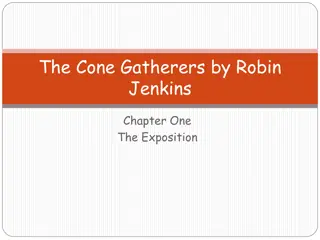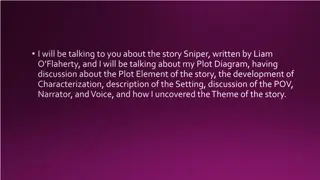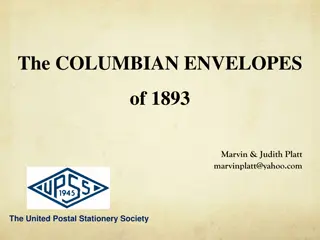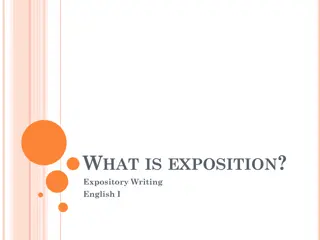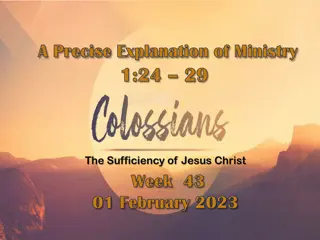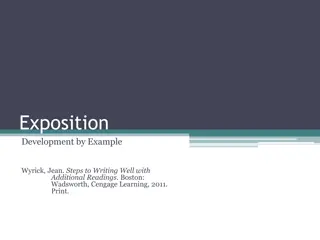Theater Conventions and Characterization in Drama
Theater conventions such as prologues, epilogues, dialogues, monologues, and dramatic structure like exposition, rising action, climax, falling action, and resolution are explored in drama. Additionally, the importance of character creation through techniques like backstories, flashbacks, and flashf
0 views • 4 slides
The Five Categories of Speech Acts Explained
Speech acts are divided into five categories: Verdicatives, Exercitives, Commisives, Behavitives, and Expositives. Verdicatives involve giving a verdict, Exercitives give a decision on a course of action, Commisives involve committing to an obligation, Behavitives are used in communication activitie
1 views • 10 slides
Understanding Plot Structure in Storytelling
Delve into the essential components of a plot - from the exposition introducing characters and setting, to the rising action building tension towards the climax, and the resolution in the falling action. Explore these elements through the journey of Tsotsi and his gang as they navigate through confl
1 views • 13 slides
Assistive Speech System for Individuals with Speech Impediments Using Neural Networks
Individuals with speech impediments face challenges with speech-to-text software, and this paper introduces a system leveraging Artificial Neural Networks to assist. The technology showcases state-of-the-art performance in various applications, including speech recognition. The system utilizes featu
1 views • 19 slides
Analysis of Saki's "The Open Window
Saki's "The Open Window" is a cleverly crafted short story revolving around a practical joke played by a young woman, Vera, on an unsuspecting visitor. The plot unfolds through the exposition, complications, climax, resolution, and conclusion stages, highlighting Vera's storytelling skills and the t
0 views • 8 slides
Understanding Plot Diagrams: Elements and Structure
A plot diagram is a framework that outlines the sequence of events in a story. It consists of key elements like exposition, inciting incident, rising action, climax, falling action, and resolution. Each element plays a crucial role in developing the plot and engaging the reader throughout the narrat
0 views • 10 slides
Backward Reasoning Approach in Exposition Questions
Utilize backward reasoning in exposition questions to underline subject matter, apply relevant physics knowledge, and deduce judgments. This strategy involves analyzing scenarios like heat transfer in making frothy milk to arrive at accurate conclusions. Through tackling questions step by step, you'
7 views • 9 slides
Exploring Literary Devices and Techniques in Storytelling
Delve into the world of storytelling with an examination of key literary devices and techniques such as plot, exposition, rising action, climax, falling action, and denouement. Understand the significance of similes, metaphors, personification, and other tools that bring narratives to life.
0 views • 82 slides
Exploring Exposition and Tolerance in "The Red Umbrella
In the lesson prepared by Jim, Sally, and Bob focusing on exposition, vocabulary, and examples of tolerance/intolerance in the first three chapters of "The Red Umbrella," key vocabulary words like "caravan," "oblivious," and "socialism" are explored. Discussion questions prompt critical thinking on
0 views • 6 slides
Regulation Policies for Cashew Market in Africa
Significant factors driving the need for regulation in the cashew market in Africa include high price volatility, low processing rates despite high production, variations in export taxes among countries, dropping quality of nuts, and challenges in local supply. Various regulatory measures such as ta
0 views • 10 slides
The God of All Comfort - Exposition on 2 Corinthians 1:1-4
Delve into the profound message of comfort and encouragement found in 2 Corinthians 1:1-4, exploring the context of the epistle to the Corinthian church and the definition of comfort as provided in the Scriptures. Discover how God, the ultimate Comforter, offers solace, hope, and peace, and explore
0 views • 16 slides
Understanding Plot Structure and Conflict in Storytelling
Plot structure is a key element in storytelling that outlines the sequence of events in a narrative. It consists of the exposition, rising action, climax, falling action, and resolution. Additionally, conflicts drive the plot by creating tension and obstacles for the characters to overcome, such as
0 views • 13 slides
Analysis of "And of Clay Are We Created" Literary Terms
In the analysis of "And of Clay Are We Created," the plot unfolds with events such as a volcano eruption in South America, a little girl trapped in the rubble, and the challenges faced in rescuing her. The story progresses through exposition, conflict, rising action, and climax, highlighting the the
0 views • 22 slides
Creating a Beowulf-Inspired Superhero for Marvel Comics
Hired by Marvel Comics, you are tasked with developing a new superhero embodying the qualities of Beowulf. This project involves designing a brave, kind, protective, and honest character with superhuman abilities and a flaw, set in an Anglo-Saxon inspired society that values bravery, honesty, and co
0 views • 12 slides
Literary Terms Guide for Academic Year
In preparation for the upcoming school year, familiarize yourself with key literary terms such as Character, Diction, Imagery, Exposition, and more. Understand the roles of Antagonists and Protagonists, learn about Diction, Denotation, Connotation, and how they shape writing. Enhance your understand
0 views • 31 slides
Character Analysis and Exposition in "The Cone Gatherers" by Robin Jenkins
The exposition of "The Cone Gatherers" introduces the characters, their relationships, sources of conflict, setting, narrative voice, motifs, symbols, and foreshadowing. Calum is depicted as having a deep affinity with nature while exhibiting childlike innocence and sensitivity. Neil struggles with
0 views • 11 slides
Understanding GraphSLAM: Mapping Urban Structures with Soft Constraints
GraphSLAM is an algorithm that extracts soft constraints from data in the form of a sparse graph to create a globally consistent map and robot path. The key idea involves resolving these constraints for accurate mapping. The exposition details assumptions, measurements, and robot poses in the GraphS
0 views • 19 slides
Understanding Psalm 51:5 - Exposition and Reflection
Delve into Psalm 51:5-7 from the King James Version, where David reflects on sin and the desire for inner purity. The passage explores the concept of inherent sinfulness, the quest for wisdom, and the cleansing power of God's grace expressed through vivid imagery. Join in the contemplation of repent
0 views • 20 slides
Advancing the African Cashew Industry: ACA Partnership and Activities
Established in 2006, the African Cashew Alliance (ACA) is a collaboration between public and private partners aiming to promote a globally competitive African cashew industry. With a focus on all aspects of the cashew value chain, ACA's mission includes providing technical assistance, promoting mark
0 views • 15 slides
Analyzing "Sniper" by Liam O'Flaherty: Plot Elements, Characterization, Setting, and Theme
Exploring the plot diagram of "Sniper" by Liam O'Flaherty, this analysis delves into the exposition, inciting incident, rising action, climax, falling action, resolution, and dènouement of the story. It discusses the development of characterization, vivid description of the setting, the importance
0 views • 12 slides
The 1893 Columbian Envelopes: A Unique Commemoration
The 1893 Columbian Envelopes were issued by the U.S.P.O.D. to commemorate the World's Columbian Exposition held in Chicago. A total of 107,632,218 envelopes in various denominations, colors, die varieties, and sizes were produced, creating a total of 78 different envelope combinations. The envelopes
0 views • 26 slides
Understanding Expository Writing: Exposition and Thesis Statements
Expository writing involves explaining, describing, and discussing a topic through a structured essay format. It centers around a clear thesis statement supported by evidence. Learn about crafting effective thesis statements and differentiating between strong and weak examples.
0 views • 12 slides
Exposition on the Sufficiency of Jesus Christ in Colossians
In the book of Colossians, Paul emphasizes the preeminence and sufficiency of Jesus Christ. Through deep gratitude, prayer, and doctrinal teachings, Paul highlights Christ's divine nature, lordship over all, and role in creation and reconciliation. This exhortation encourages believers to remain ste
0 views • 39 slides
ORGANIZATION OF CASHEW SECTOR POLICIES IN AFRICA
The article discusses the organizational policies in the cashew sector in Africa, focusing on the free movement of goods and people in the ECOWAS zone. It highlights the obstacles to trade such as roadblocks and illegal payments along various corridors. It concludes with the challenges faced in impl
0 views • 8 slides
Mastering the Art of Exposition through Development by Example
Understanding the importance of development by example in writing: from vague vs. specific examples to the three types of examples - series, specific, and explanation. Enhance clarity and impact in your writing by learning effective illustration techniques.
0 views • 22 slides
SANIMART Virtual Exposition: Innovations for Safe Workspaces in the COVID-19 Era
The SANIMART virtual exposition organized by the Confederation of Indian Industry aims to showcase innovations in the sanitation and personal hygiene space to combat the challenges posed by the COVID-19 pandemic. From sanitization industry products to technology applications, safety equipment, COVID
0 views • 14 slides
